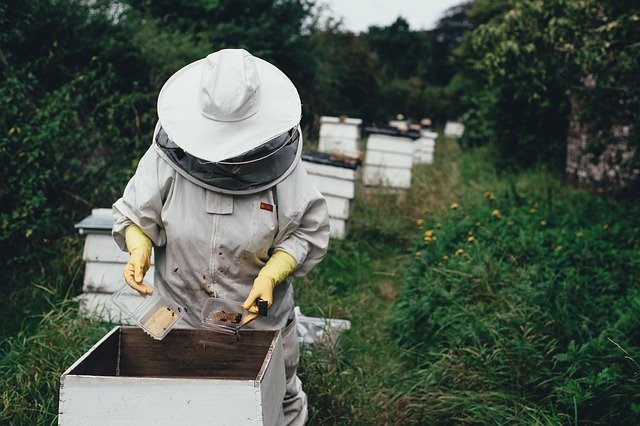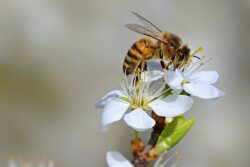Insects are not typically on the top of most peoples lists of favorite animals because of the pest we deal with on a regular basis. This can make it easy to overlook all of the positive benefits insects can have. In actuality, only about 3% of insects are ever considered pest leaving the other 97% to perform important environmental functions and even benefits. One of the most important beneficial insects being bees and more specifically honey bees. Let’s take a deep look at the benefits of Honey Bees.
Benefits of Honey Bees
 Honey bees were actually introduced from Europe to help pollinate crops and produce honey. Although honey bees are not native to North America, they are now integrated into the landscape and play key roles in agriculture and our society. From the small hobby hive in someone’s back yard to large commercial apiaries that travel all over the country with there bees to pollinate tree fruits, vegetables and flowers.
Honey bees were actually introduced from Europe to help pollinate crops and produce honey. Although honey bees are not native to North America, they are now integrated into the landscape and play key roles in agriculture and our society. From the small hobby hive in someone’s back yard to large commercial apiaries that travel all over the country with there bees to pollinate tree fruits, vegetables and flowers.
Most flowering plants rely on bees for pollination and we would not be able to produce the volume of food we do without them. They also produce food for us directly by making the honey we use for eating, drinking, and cooking. Even the wax produced by honey bees is used in items like candles, health and beauty products and other home goods.
Its not just the honey bees that offer important services for us. There are many species of native bumble bees, mason bees, leafcutter bees, carpenter bees and sweat bees. With the exception of bumble bees, these other bee species are solitary and do not form a hive. Although these species do not socialize to the extent that honey bees do and produce honey in a hive, they are extremely important in pollination. Some plants even require certain species of bees and behaviors in order for them to be pollinated properly.
Varroa Mites and Colony Collapse Disorder
Honey bees are under incredible stress these days with Colony Collapse Disorder (CCD). Varroa mites are the single most significant cause of CCD but also, viruses and the use of certain pesticides. Pesticides seem to get the most blame for declining bees and in some cases, it is warranted given missuses of insecticides on flowering plants. It is expected that bees, being insects, will of course be impacted by insecticides. By using newer products designed to have less or no impact on bees and being mindful of how and where they are applied, we can greatly reduce how insecticide applications will affect bees.
Varroa mites are external parasites much like ticks are to people except they are roughly about 10% the size of a honey bee. That would be about the equivalent of a tick the size of an average smart phone on a human. If that all were not enough, all bee species including honey bees are suffering from habitat losses. Increased fragmentation from houses and urban environments make it harder for bees to forage and find suitable flowers and places to nest.
Commercial bee hives that travel the country are subject to large monocultures of crops of all the same kind and weeds are reduced to also increase yields. Lack of variety of flowering plants equates to having a poor diet which adds more stress to an already stressful situation.
How You Can Help
 We can all help native and honey bee populations by planting native plants and flowers in our yards. Native plants tend to be more beneficial nectar producers and have a greater benefit, but some introduced plants can be important as well. Planting a variety of flowering trees, shrubs and flowers with various bloom periods is the best way to ensure bees and other pollinators have the resources they need to thrive.
We can all help native and honey bee populations by planting native plants and flowers in our yards. Native plants tend to be more beneficial nectar producers and have a greater benefit, but some introduced plants can be important as well. Planting a variety of flowering trees, shrubs and flowers with various bloom periods is the best way to ensure bees and other pollinators have the resources they need to thrive.
The Natural Resource Conservation Service and USDA have a nice web link for Pollinator Friendly Plants for the Northeast United States. What is nice about this list is they have pictures of the plants and key characteristics that make it easy to see what the flowers look like and when they will flower etc.
Hobby Honey Bee Hives
Hobby honey bee hives have become very popular these days and there are even services that are dedicated to hobby bee keeping. Keeping honey bees can be rewarding, but also can be a lot of work to maintain. Another useful project you can do for your home is to build a simple “Bee Hotel.” These bee hotels can be very simple to make or as elaborate as you want and can event be purchased pre made online. Creating hollows of various diameter will attract native bees to your garden and help the local population of native bees.
